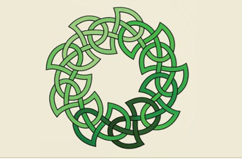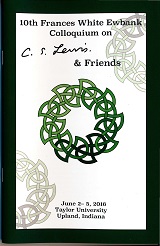Event Title
Paper Session 1-C: Lewis and His Circle(s)
Location
Euler 118
Start Date
2-6-2016 3:30 PM
Description
"Voices of Friendship from within the C. S. Lewis Circle" - Roger White
In the tradition of previous collections of memoirs, such as Light on C. S. Lewis (1965) and C. S. Lewis at the Breakfast Table (1979), comes a new primary source anthology from Oxford University Press culminating a seven-year project that originated in the archives of the Oxford C. S. Lewis Society. Roger White, lead editor of C. S. Lewis and His Circle: Essays and Memoirs From the Oxford C. S. Lewis Society (Oxford University Press, 2015), describes the process of curating the unique assortment of transcribed talks gleaned from the last thirty years of the Society's history. The illuminating story of how this collection was developed provides the backdrop for the literary introduction to the book's contributors and their affinity with Lewis and his circle. The impressive list of contributors includes Lewis's friends, academic associates, family, and fellow Inkling members. The voices of friendship are clearly heard in the reminiscences offered by Owen Barfield, John Wain, Stella Aldwinckle, Elizabeth Anscombe, Walter Hooper and many others. The session features audio excerpts from the original Society recordings and brief readings from selected chapters
"Monster in the Mirror: Technology, Science Fiction, and The Abolition Man" - Mark Eckel
Science fiction reminds us of the curse of being human: our limitations. Every step we come closer to perfection we encounter barriers which remind us of our imperfections. There is a subtle but strong commitment in futuristic writing which bends toward Utopia, the desire for completion on earth, by humans. What we discover more often is a dystopia which mandates human slavery in its many forms. From whence comes what was hopeful turned to doubt? From technological abandon. Why do we continue to pursue that which will cause us the most trouble? Because of our human belief that the only ethical boundaries are those we create for ourselves, resulting in man's abolition. Technology, our savior, becomes our destroyer.
Science fiction exists because we know there is something more. Ancient to modern rendition of futuristic hopes and fears depend on assumptions about humanness, knowledge, and reality which are impacted by our created technology. Our desire to circumvent time-space boundaries leads us to build machines so we can cross dimensions. Our devotions to knowledge ignores ethical limits so we can explore seemingly limitless curiosities. Our dedication to progress resents any purpose other than addiction to betterment. Our definitions stand as totems to which we give obeisance; our interest is information over truth. "Monster in the Mirror" will explore our assumptions about technology, the change technology makes in us, the techno-human impact by considering various science fiction films, with intersections to C. S. Lewis's techno-theological concerns in The Abolition of Man.
"Old friends: Lewis and his Medieval Alter-ego" - Chris R. Armstrong
We may think of our relationship with writers who have gone on before as one of friendship. Lewis talked about his own interactions with thinkers and writers of other ages in similar ways. And his literary "friendships" both contemporary and historical, both literary and philosophical, have been much-studied. This paper examines how Lewis was transformed by his "medieval friend" and, in some way, alter-ego, Boethius. Although Lewis's scholarly work as a medievalist has received attention in a number of books, few have looked beyond the professional dimension to the personal, transformational dimensions of Lewis's medievalism (David Downing has). How did Boethius change the ways Lewis thought about, wrote about, and lived out his Christian faith? And how and why did Lewis introduce those friends to his living friends - and indeed to us, his friends of another generation? Indeed, how might Lewis suggest to us that medieval friends, like Boethius, could still prove transformative today?
Event Type
Paper
Paper Session 1-C: Lewis and His Circle(s)
Euler 118
"Voices of Friendship from within the C. S. Lewis Circle" - Roger White
In the tradition of previous collections of memoirs, such as Light on C. S. Lewis (1965) and C. S. Lewis at the Breakfast Table (1979), comes a new primary source anthology from Oxford University Press culminating a seven-year project that originated in the archives of the Oxford C. S. Lewis Society. Roger White, lead editor of C. S. Lewis and His Circle: Essays and Memoirs From the Oxford C. S. Lewis Society (Oxford University Press, 2015), describes the process of curating the unique assortment of transcribed talks gleaned from the last thirty years of the Society's history. The illuminating story of how this collection was developed provides the backdrop for the literary introduction to the book's contributors and their affinity with Lewis and his circle. The impressive list of contributors includes Lewis's friends, academic associates, family, and fellow Inkling members. The voices of friendship are clearly heard in the reminiscences offered by Owen Barfield, John Wain, Stella Aldwinckle, Elizabeth Anscombe, Walter Hooper and many others. The session features audio excerpts from the original Society recordings and brief readings from selected chapters
"Monster in the Mirror: Technology, Science Fiction, and The Abolition Man" - Mark Eckel
Science fiction reminds us of the curse of being human: our limitations. Every step we come closer to perfection we encounter barriers which remind us of our imperfections. There is a subtle but strong commitment in futuristic writing which bends toward Utopia, the desire for completion on earth, by humans. What we discover more often is a dystopia which mandates human slavery in its many forms. From whence comes what was hopeful turned to doubt? From technological abandon. Why do we continue to pursue that which will cause us the most trouble? Because of our human belief that the only ethical boundaries are those we create for ourselves, resulting in man's abolition. Technology, our savior, becomes our destroyer.
Science fiction exists because we know there is something more. Ancient to modern rendition of futuristic hopes and fears depend on assumptions about humanness, knowledge, and reality which are impacted by our created technology. Our desire to circumvent time-space boundaries leads us to build machines so we can cross dimensions. Our devotions to knowledge ignores ethical limits so we can explore seemingly limitless curiosities. Our dedication to progress resents any purpose other than addiction to betterment. Our definitions stand as totems to which we give obeisance; our interest is information over truth. "Monster in the Mirror" will explore our assumptions about technology, the change technology makes in us, the techno-human impact by considering various science fiction films, with intersections to C. S. Lewis's techno-theological concerns in The Abolition of Man.
"Old friends: Lewis and his Medieval Alter-ego" - Chris R. Armstrong
We may think of our relationship with writers who have gone on before as one of friendship. Lewis talked about his own interactions with thinkers and writers of other ages in similar ways. And his literary "friendships" both contemporary and historical, both literary and philosophical, have been much-studied. This paper examines how Lewis was transformed by his "medieval friend" and, in some way, alter-ego, Boethius. Although Lewis's scholarly work as a medievalist has received attention in a number of books, few have looked beyond the professional dimension to the personal, transformational dimensions of Lewis's medievalism (David Downing has). How did Boethius change the ways Lewis thought about, wrote about, and lived out his Christian faith? And how and why did Lewis introduce those friends to his living friends - and indeed to us, his friends of another generation? Indeed, how might Lewis suggest to us that medieval friends, like Boethius, could still prove transformative today?


